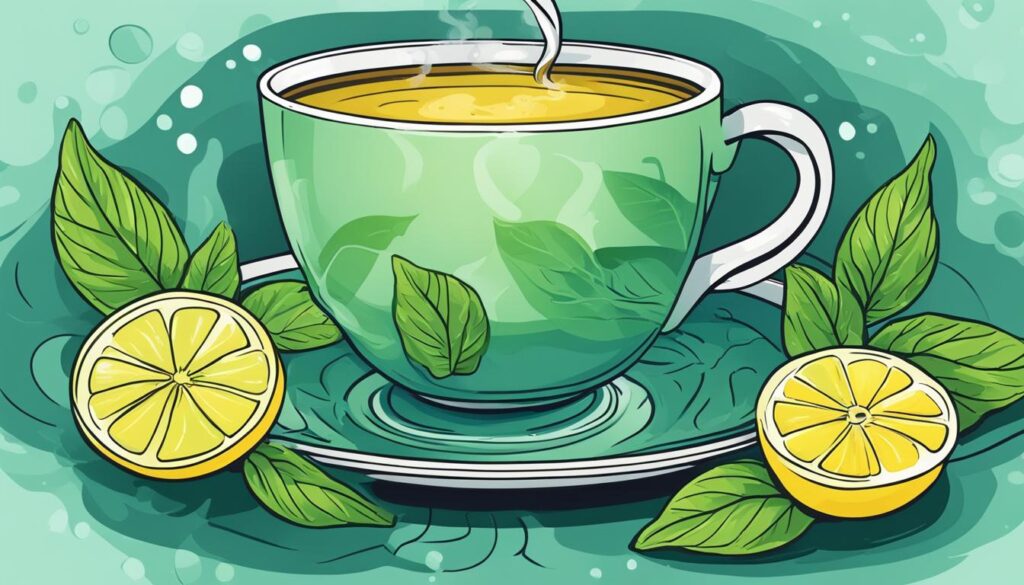
The common cold is a frequent illness caused by various viruses, primarily rhinoviruses. Symptoms may include nasal congestion, cough, sore throat, and fatigue. Medicinal plants have been used for centuries to relieve cold and flu symptoms and boost the immune system.
This article explores different herbal remedies and their effectiveness in treating common colds.
Key Takeaways:
- Natural remedies for colds can help alleviate symptoms and boost the immune system.
- Medicinal plants like garlic, ginger, echinacea, peppermint, and thyme have properties that can provide relief from common cold symptoms.
- It’s important to consult with a healthcare professional before using herbal remedies, especially if you have any existing medical conditions or are taking medications.
- There are various ways to incorporate medicinal plants into your cold relief routine, such as consuming them as teas, tinctures, or supplements.
- Ensure the quality and proper sourcing of medicinal plants for maximum effectiveness and safety.
The Benefits of Medicinal Plants for Cold Relief
Medicinal plants offer a natural and holistic approach to managing cold symptoms and providing relief from the common cold. These plants have antimicrobial, anti-inflammatory, and immune-boosting properties that can help alleviate congestion, soothe sore throats, and reduce coughing.
By using plant-based treatments, individuals can opt for alternative remedies for colds, avoiding over-the-counter medications and potentially experiencing additional benefits.
When it comes to medicinal plants for cold relief, there are several advantages to consider. Firstly, these plant-based treatments can be highly effective without the potential side effects commonly associated with synthetic or chemical medications.
Medicinal plants are often readily available and can be easily incorporated into daily routines. They provide a natural alternative to traditional cold remedies, allowing individuals to support their immune system and promote overall well-being.
It’s important to note that the benefits of medicinal plants may vary depending on the specific plant and its properties. Different plants possess unique qualities that can target specific cold symptoms.
So, it’s essential to explore the various medicinal plants commonly used for treating cold symptoms and determine which ones align with individual needs and preferences.
The Benefits of Medicinal Plants for Cold Relief
| Medicinal Plant | Properties | Benefits |
|---|---|---|
| Garlic | Antibacterial, antiviral | Fights off viruses and bacteria, boosts immune system |
| Ginger | Anti-inflammatory, antiviral | Soothes digestive issues, clears sinuses, improves immunity |
| Echinacea | Immune-boosting | Reduces duration and severity of cold symptoms, stimulates immune system |
| Peppermint | Antimicrobial, decongestant | Relieves congestion, soothes sore throats, reduces coughing |
| Thyme | Antimicrobial, expectorant | Clears congestion, reduces coughing, fights off infections |
By incorporating medicinal plants into a cold relief routine, individuals can harness the power of natural remedies. Options include consuming plants as teas, tinctures, or supplements, using fresh herbs in cooking, or inhaling essential oils.
It’s recommended to experiment with different herbal remedies to find the most effective approach for each individual. However, it’s always advisable to consult with a healthcare professional, especially for individuals with existing medical conditions or those currently taking medications.
Overall, medicinal plants offer a promising avenue for individuals seeking alternative remedies for colds. Their numerous benefits, ranging from their natural properties and effectiveness to their ease of accessibility, make them a compelling choice for managing cold symptoms and promoting overall wellness.
Common Medicinal Plants for Cold Relief
When it comes to finding natural remedies for common colds, medicinal plants have been used for centuries to alleviate symptoms and support the immune system.
These plants offer a holistic approach to cold relief, harnessing their antimicrobial, anti-inflammatory, and immune-boosting properties. Below are some commonly used medicinal plants for treating cold symptoms:
1. Garlic
Garlic is well-known for its antibacterial and antiviral properties. It can help fight off viruses and bacteria that cause colds. Consuming garlic can boost your immune system and alleviate symptoms such as coughs and congestion. You can add garlic to your meals or take it in supplement form.
2. Ginger
Ginger is not only a popular spice but also a powerful natural remedy for cold symptoms. It has anti-inflammatory and antiviral properties that help relieve congestion, soothe sore throats, and improve overall immunity. You can enjoy ginger tea or incorporate it into your meals for its therapeutic benefits.
3. Echinacea
Echinacea is widely used to boost the immune system and reduce the duration and severity of cold symptoms. This herb stimulates the immune system, allowing your body to fight off the common cold more effectively. You can find echinacea in various forms such as teas, tinctures, and supplements.
4. Peppermint
Peppermint has a refreshing and cooling effect that can provide relief for cold symptoms. It contains menthol, which acts as a natural decongestant and soothes sore throats. Whether you opt for peppermint tea or peppermint oil inhalation, incorporating this herb into your cold relief routine can promote easier breathing.
5. Thyme
Thyme is a powerful herb with antimicrobial, expectorant, and antiseptic properties. It can help clear congestion, reduce coughing, and fight off infections. Gargling with thyme-infused water or enjoying thyme tea can provide relief for sore throats and congestion.
By incorporating these medicinal plants into your cold relief routine, you can take advantage of their natural benefits. Whether consumed as teas, added to meals, or used as supplements, these herbs offer a holistic approach to treating common cold symptoms.
It’s important to remember that if you have any existing medical conditions or are taking medications, it’s best to consult with a healthcare professional before using herbal remedies.
Using Garlic for Cold Relief
Garlic has long been recognized for its potential benefits in relieving common cold symptoms. Its natural antimicrobial properties can help fight off viruses and bacteria, aiding in the recovery process. Consuming garlic can not only boost the immune system but also alleviate symptoms such as coughs and congestion.
There are various ways to incorporate garlic into your cold relief routine. You can add fresh garlic to your meals for a flavorful and immune-boosting twist.
Alternatively, garlic supplements are also available for those who prefer a more convenient option. These supplements often come in the form of capsules or tablets, providing a concentrated dose of garlic’s active compounds.
It’s important to note that while garlic can be a useful natural remedy for cold relief, it may not be suitable for everyone. Some individuals may experience adverse effects or interactions with certain medications.
It’s always recommended to consult with a healthcare professional before incorporating garlic or any other herbal remedies into your routine, especially if you have any existing medical conditions or are taking medications.
| Benefits of Garlic for Cold Symptoms |
|---|
| Antimicrobial properties |
| Boosts the immune system |
| Alleviates coughs and congestion |
By harnessing the power of garlic, you can potentially enhance your body’s ability to combat the common cold. However, always exercise caution and seek professional advice to ensure safe and effective use.
The Power of Ginger for Cold Relief
Ginger is a natural remedy that has been used for centuries to alleviate cold symptoms. Its unique combination of anti-inflammatory, antiviral, and warming properties makes it a powerful tool in fighting the common cold. Whether consumed as ginger tea or added to meals, ginger can provide relief for congestion, sore throat, and overall immunity.
One of the key benefits of ginger is its ability to soothe digestive issues, which can be common during a cold. It helps in reducing nausea and improving digestion, allowing your body to absorb nutrients and boost your immune system. In addition, ginger’s antiviral properties can help inhibit the growth of viruses, potentially reducing the severity and duration of a cold.
The Benefits of Ginger for Cold Symptoms
Relieves congestion:
Ginger works as a natural decongestant, helping to clear nasal passages and relieve congestion. Its warming properties also provide a comforting sensation, making it easier to breathe during a cold.
Soothes sore throats:
Ginger has anti-inflammatory properties that can help reduce inflammation and soothe sore throats. Consuming ginger tea or adding ginger to warm water with honey can provide relief and alleviate discomfort.
Boosts immunity:
The immune-boosting properties of ginger can help strengthen your body’s defenses against the cold virus. By supporting your immune system, ginger may help reduce the frequency and severity of cold symptoms.
| Ginger | Benefits for Cold Symptoms |
|---|---|
| Relieves congestion | Clears nasal passages and eases breathing |
| Soothes sore throats | Reduces inflammation and provides comfort |
| Boosts immunity | Strengthens the body’s defenses against colds |
When incorporating ginger into your cold relief routine, consider drinking ginger tea by steeping fresh ginger in hot water or adding ginger to meals as a flavorful and healing ingredient.
It’s important to note that ginger may interact with certain medications, so it’s advisable to consult with a healthcare professional before using ginger as a remedy, especially if you have any underlying health conditions or take medication regularly.
By harnessing the power of ginger, you can find natural relief for cold symptoms while enjoying its delicious flavor and health benefits. Whether it’s by sipping ginger tea or adding ginger to your meals, this herbal remedy can provide comfort and support during the common cold.

Echinacea: A Natural Immune Booster for Cold Relief
Echinacea is a popular herbal remedy for boosting the immune system and reducing the duration and severity of cold symptoms. This flowering plant has been used for centuries for its medicinal properties, particularly in treating respiratory infections and promoting overall wellness.
One of the key benefits of echinacea is its ability to stimulate the immune system, helping the body fight off the common cold more effectively. It contains compounds that activate immune cells and enhance their ability to identify and destroy invading pathogens.
Echinacea is available in various forms, including teas, tinctures, and supplements. It is important to note that the quality and potency of echinacea products can vary, so it’s advisable to choose reputable brands and carefully follow the recommended dosage instructions.
Always consult with a healthcare professional before incorporating echinacea or any herbal remedy into your cold relief routine, especially if you have any existing medical conditions or are taking medications.
| Echinacea Benefits | How to Use |
|---|---|
| Boosts the immune system | Drink echinacea tea or take a tincture or supplement |
| Reduces the duration and severity of cold symptoms | Follow recommended dosage instructions |
| Provides relief for respiratory infections | Choose high-quality echinacea products |
When used as directed and in combination with a healthy lifestyle, echinacea can be a valuable tool in managing cold symptoms and supporting the body’s natural defense mechanisms. Remember, it’s always best to consult with a healthcare professional for personalized advice and guidance.
Peppermint: A Refreshing Remedy for Cold Symptoms
Peppermint is a popular herbal remedy that offers a refreshing and cooling effect, making it a great remedy for common cold symptoms. It contains menthol, which acts as a natural decongestant and can help alleviate congestion and promote easier breathing. Additionally, peppermint has soothing properties that can provide relief for sore throats and reduce coughing.
One of the benefits of peppermint for cold symptoms is its ability to clear nasal passages and relieve congestion. Inhaling steam infused with peppermint oil or drinking peppermint tea can help open up the airways, making it easier to breathe. Its cooling sensation can also provide relief for irritated throat tissues, reducing discomfort and soothing sore throats.
To incorporate peppermint into your cold relief routine, you can brew a cup of peppermint tea by steeping dried peppermint leaves in hot water for 5-10 minutes.
You can also inhale the steam by adding a few drops of peppermint oil to a bowl of hot water, covering your head with a towel, and breathing in the vapor. These methods can help alleviate cold symptoms and provide a refreshing sensation.

| Benefits of Peppermint for Cold Symptoms |
|---|
| Relieves congestion |
| Soothes sore throats |
| Reduces coughing |
| Clears nasal passages |
| Provides a cooling sensation |
The Power of Thyme for Cold Relief
Thyme is a powerful herb that has been used for centuries to alleviate cold symptoms and promote overall wellness. It possesses antimicrobial, expectorant, and antiseptic properties, making it an effective remedy for common colds. By incorporating thyme into your cold relief routine, you can experience its numerous benefits in a natural and holistic way.
One of the key benefits of thyme is its ability to clear congestion and reduce coughing. Its expectorant properties help to loosen and expel mucus from the respiratory system, providing relief from chest congestion. Thyme can also help soothe sore throats and reduce inflammation, making it an ideal herb for cold symptom relief.
To harness the power of thyme, you can prepare thyme tea by steeping fresh or dried thyme leaves in hot water for 10-15 minutes. Alternatively, you can gargle with thyme-infused water to provide relief for sore throats. Adding thyme to your meals as a flavorful herb is another way to incorporate its benefits into your diet.
Thyme’s Benefits for Cold Symptoms
| Benefits of Thyme | How Thyme Helps |
|---|---|
| Clears congestion | Thyme acts as an expectorant, helping to loosen and expel mucus from the respiratory system. |
| Reduces coughing | Thyme’s expectorant properties can help suppress coughing and provide relief from persistent coughs. |
| Soothes sore throats | Thyme has anti-inflammatory properties that can help reduce throat inflammation and provide relief from discomfort. |
| Fights off infections | Thyme’s antimicrobial and antiseptic properties help combat bacteria and viruses, supporting the body’s natural defense against infections. |
When using thyme for cold relief, it’s important to ensure you are using quality, properly sourced thyme to maximize its effectiveness and safety. If you have any existing medical conditions or are taking medications, it’s always best to consult with a healthcare professional before incorporating herbal remedies into your routine.
By harnessing the power of thyme, you can find natural relief from common cold symptoms and support your body’s healing process. Whether through thyme tea, gargling with thyme-infused water, or adding thyme to your meals, this versatile herb can be an excellent addition to your cold relief regimen.

Precautions and Considerations When Using Medicinal Plants
When using medicinal plants for cold relief, it is essential to take certain precautions and consider a few important factors to ensure your safety and maximize the effectiveness of these herbal remedies.
Purchase from Reliable Sources
Firstly, it is crucial to source your medicinal plants from reputable and trustworthy suppliers. This ensures that you are obtaining high-quality herbs that are free from contaminants and have been properly sourced. By purchasing from reliable sources, you can have confidence in the safety and efficacy of the medicinal plants you are using.
Consult with a Healthcare Professional
Before incorporating herbal remedies into your cold relief routine, it is advisable to consult with a healthcare professional, especially if you have any underlying health conditions or are taking medications. They can provide personalized guidance and ensure that the medicinal plants you plan to use do not interact adversely with any existing treatments or medications.
Follow Proper Dosage and Duration
It is important to follow the recommended dosage instructions for each medicinal plant and adhere to the specified duration of use. While these herbal remedies are considered natural, excessive or prolonged use may lead to undesired effects. By following the proper dosage and duration, you can ensure the safe and effective use of medicinal plants for cold relief.
Be Aware of Allergic Reactions
Some individuals may be allergic to certain medicinal plants. If you have a known allergy to specific plants or suspect that you may be allergic, it is crucial to exercise caution and avoid using those particular herbs. Pay attention to any signs of allergic reactions such as skin rashes, itching, or difficulty breathing, and seek medical attention if necessary.
Summary:
When using medicinal plants for cold relief, it is important to purchase them from reliable sources, consult with a healthcare professional, follow proper dosage and duration guidelines, and be aware of any potential allergies. By taking these precautions and considerations, you can safely incorporate herbal remedies into your cold relief routine and experience their potential benefits.
Incorporating Medicinal Plants Into Your Cold Relief Routine
When it comes to finding natural relief for common cold symptoms, incorporating medicinal plants into your cold relief routine can be a great option. There are various ways to incorporate these herbal remedies into your daily routine, allowing you to take advantage of their therapeutic benefits.
Whether you prefer consuming them as teas, tinctures, or supplements, or using fresh herbs in cooking or inhaling essential oils, there’s a method that suits everyone’s preference.
One popular way to incorporate medicinal plants into your routine is by consuming them as herbal teas. Not only are herbal teas soothing and comforting, but they also offer the added benefits of the medicinal plants they contain.
For example, ginger tea can help alleviate congestion and soothe sore throats, while peppermint tea acts as a natural decongestant and can provide relief for cold symptoms.
Another option is to incorporate medicinal plants into your meals. Adding fresh herbs like garlic and thyme to your cooking not only adds flavor but also provides potential cold relief benefits.
Garlic has antimicrobial properties that can help fight off viruses and bacteria, while thyme has antimicrobial and expectorant properties that can help clear congestion and reduce coughing.
If you prefer a more concentrated form of herbal remedies, you can opt for supplements or essential oils. These can be easily incorporated into your routine by following the recommended dosage or using them topically, respectively.
It’s essential to consult with a healthcare professional before starting any new supplements or using essential oils to ensure their effectiveness and safety.
Incorporating Medicinal Plants Into Your Cold Relief Routine
| Medicinal Plant | Benefits |
|---|---|
| Garlic | Antimicrobial properties; boosts the immune system |
| Ginger | Anti-inflammatory and antiviral properties; relieves congestion and soothes sore throats |
| Echinacea | Boosts the immune system and reduces the duration of cold symptoms |
| Peppermint | Natural decongestant; relieves congestion and soothes sore throats |
| Thyme | Antimicrobial and expectorant properties; clears congestion and reduces coughing |
Incorporating medicinal plants into your cold relief routine is a natural and holistic way to find relief from common cold symptoms. Whether you choose to consume them as teas, add them to your meals, or use them in supplement or essential oil form, these herbal remedies can provide potential benefits for your overall well-being.
It’s important to remember that herbal remedies may not work the same for everyone, and it’s always recommended to seek professional advice if needed.
Medicinal plants offer a natural and holistic approach to relieving common cold symptoms. Garlic, ginger, echinacea, peppermint, and thyme are among the commonly used herbs for cold relief.
These plants have antimicrobial, anti-inflammatory, and immune-boosting properties that can provide relief and support the body’s natural healing processes.
It’s important to remember that while medicinal plants can be effective in treating cold symptoms, it’s essential to take precautions and consult with a healthcare professional.
This is especially important if you have any underlying medical conditions or are taking medications. A healthcare professional can provide guidance on the proper use and dosage of herbal remedies for your specific needs.
To incorporate medicinal plants into your cold relief routine, you can consume them as teas, tinctures, or supplements. You can also utilize fresh herbs in cooking or inhale essential oils for their therapeutic benefits. It may take some experimentation to find the herbal remedies that work best for you.
Overall, incorporating medicinal plants into your cold relief routine offers a natural and potentially effective alternative to over-the-counter medicines.
By taking precautions and seeking professional advice when needed, you can harness the power of these herbal remedies to alleviate common cold symptoms and support your overall well-being.
FAQ
How can I use medicinal plants for common colds?
Medicinal plants can be used in various forms such as teas, tinctures, or supplements. You can also incorporate them into your cooking or inhale essential oils for their therapeutic benefits.
What are the benefits of using medicinal plants for cold relief?
Medicinal plants have antimicrobial, anti-inflammatory, and immune-boosting properties that can help alleviate congestion, soothe sore throats, and reduce coughing. They offer a natural and holistic approach to managing cold symptoms.
Which medicinal plants are commonly used for cold relief?
Some commonly used medicinal plants for cold relief include garlic, ginger, echinacea, peppermint, and thyme. These plants have properties that can help fight off viruses, boost the immune system, and alleviate cold symptoms.
How can garlic be used for cold relief?
Garlic can be consumed raw, cooked, or in supplement form to boost the immune system and alleviate cold symptoms. It has antimicrobial properties that can help fight off viruses and bacteria.
What are the benefits of using ginger for cold relief?
Ginger has warming properties and can help soothe digestive issues. It also has anti-inflammatory and antiviral properties that can alleviate cold symptoms such as congestion, sore throat, and coughing.
How does echinacea help with cold relief?
Echinacea is known for its immune-boosting properties. It stimulates the immune system, helping the body fight off the common cold more effectively. It is available in various forms such as teas, tinctures, and supplements.
What are the benefits of using peppermint for cold relief?
Peppermint has a refreshing and cooling effect that can help alleviate congestion, soothe sore throats, and reduce coughing. It contains menthol, which acts as a natural decongestant.
How can thyme be used for cold relief?
Thyme has antimicrobial, expectorant, and antiseptic properties that make it an effective remedy for cold symptoms. Drinking thyme tea or gargling with thyme-infused water can provide relief for sore throats and congestion.
What precautions should I take when using medicinal plants?
It’s important to consult with a healthcare professional before using herbal remedies, especially if you have any existing medical conditions or are taking medications. Considerations should also be made for potential interactions and the proper sourcing of medicinal plants.
How can I incorporate medicinal plants into my cold relief routine?
You can consume medicinal plants as teas, tinctures, or supplements. Using fresh herbs in cooking or inhaling essential oils can also provide benefits. It’s a matter of personal preference and experimentation to find what works best for you.







One Comment
Comments are closed.